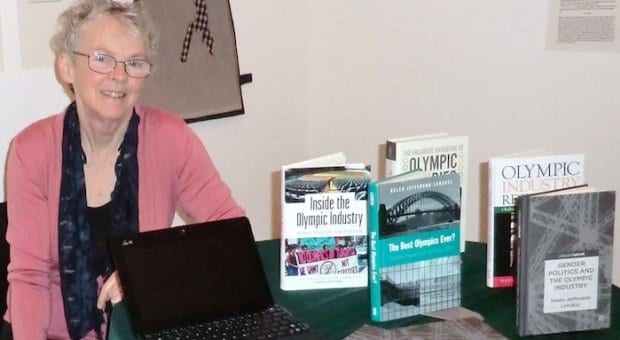On Feb 13 — while much of Toronto watched Canada’s first men’s hockey game in Sochi — about 20 people gathered at a library to hear one of the city’s most vocal critics of the Olympic Games as she launched her new book.
An ideological world away from the jubilant viewing parties at PrideHouseTO and the CBC, Helen Lenskyj presented Sexual Diversity and the Sochi 2014 Olympics, a book that sees the Games as reinforcement of traditional gender roles masked in mythic fervour.
The academic text, one of many Lenskyj has written about the sport monolith, targets Russia’s anti-gay laws, examining “the erosion of civil society in contemporary Russia and [President Vladimir] Putin’s role in repressing dissident voices.” It also puts much blame on the International Olympic Committee for failing to use its power to prevent its 2014 host from criminalizing homosexuality just a year before the Games.
The book’s subtitle, No More Rainbows, makes the very literal point that sporting the innocuous LGBT symbol in public is now enough to fall afoul of the law.
“Any public place is a place minors might be present, and a rainbow is now considered propaganda,” said Lenskyj, a University of Toronto professor emeritus who has focused her career on gender and sport.
To prove her point, she showed before-and-after photos of Swedish high jumper Emma Green Tregaro at last summer’s World Athletics Championships in Moscow. The law was still fresh and Tregaro had painted her nails in rainbow colours. After a complaint from a Russian opponent citing the law, event officials asked her to redo them.
Ever since, a lack of strong criticism from the rest of the world — but especially the IOC — has given Putin the green light, Lenskyj said. “It is like saying, ‘Go ahead, Putin. We think the Olympics are only about sport because we’re so naive.”
That false narrative — that sport and politics don’t mix — allows the IOC to slough off its share of the blame, she said.
“[IOC president Thomas Bach] told [CBC news anchor] Peter Mansbridge recently that they couldn’t do anything about Russia’s laws because [the IOC is] not a state. Yet the IOC has decided many times who is a state or not. They have enormous power.”
The pseudo-religious hype around the Olympics is not unlike that built around Putin himself, Lenskyj told the group — just before some guy piped up to tell everyone the hockey score.
Both also have “undemocratic governance, a lack of transparency, fraudulent voting processes and systematic sexism,” Lenskyj said.
“I am pleased to say that Toronto has had two failed Olympic bids. I think it would be disastrous for the city — it’s the one thing I agree on with Mayor Ford.”
Sexual Diversity and the 2014 Olympics: No More Rainbows is published by Palgrave Macmillan. It is available in print and as an e-book.


 Why you can trust Xtra
Why you can trust Xtra


